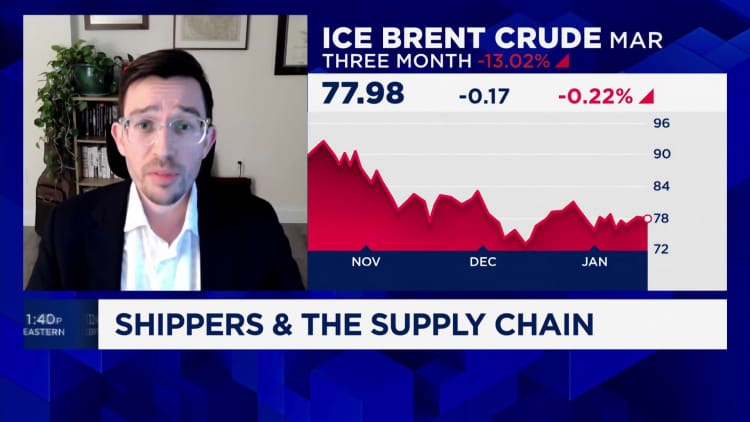
Houthi followers lift rifles and shout slogans against the U.S.-U.K. during a tribal gathering on January 14, 2024 on the outskirts of Sana’a, Yemen.
Mohammed Hamoud | Getty Images
DUBAI, United Arab Emirates — Yemen’s Houthi rebels are enthusiastically “confronting America directly,” the organization’s leader said in a televised speech, vowing to continue the group’s campaign of attacks on ships in the Red Sea until Israel’s blockade of Gaza is lifted.
The remarks came as the U.S. steps up its strikes on Houthi targets and ahead of President Joe Biden’s admission to reporters that so far, his administration’s military action was not having its intended effect.
“When you say working, are they stopping the Houthis?” Biden said in an exchange with reporters in Washington, D.C. “No. Are they going to continue? Yes.” The White House re-designated the Houthis as a terrorist organization on Jan. 17, after de-listing the group in 2021.
The U.S. carried out its fifth airstrike against Houthi targets in Yemen late Thursday night, with American jets targeting anti-ship missiles that U.S. Central Command said “were aimed into the southern Red Sea and prepared to launch.”
As if to validate Biden’s comments, the Iran-backed rebel group within hours launched two anti-ship ballistic missiles at a U.S.-owned tanker. The vessel, a small chemical tanker called the Chem Ranger, reported no injuries or damage to the ship.
It is “a great honor and blessing to be confronting America directly,” Houthi leader Abdul-Malek al-Houthi said in his defiant, hour-long speech that leaned heavily on religious rhetoric. He claimed that the U.S. and U.K. strikes on Yemen only sharpened his military’s technology, and that it proved the Houthis’ strategy — which targeted Israeli ships or those coming to or from Israel — was working.

The Houthis’ actions have certainly worked to disrupt transport and seaborne trade in the region: Major shipping firms have suspended all Red Sea and Suez Canal transport, opting to sail around the continent of Africa instead, creating significant delays and supply bottlenecks and costing companies billions of dollars.
Al-Houthi also made a personal swipe at the American president, mocking Biden as “an elderly man that has trouble climbing the stairs of an airplane yet is travelling 9,000 miles to attack those that wanted to stand by the oppressed people of Gaza.”
The Biden administration along with the U.K. government began launching retaliatory strikes at the Houthis, who control most of Yemen, on Jan. 12 after the group spent a number of weeks carrying out dozens of attacks on ships traversing the Red Sea. The Yemeni rebels say their campaign is in response to Israel’s relentless bombardment of the Gaza Strip and the U.S.’s support for it.

The Houthi leader vowed to continue the attacks until Israel lifts its blockade of Gaza, saying that “nothing – not all the threats, the missiles, the pressure – will change our position.”
Israel’s offensive against Gaza began after Hamas militants from the Palestinian enclave launched a terror attack on southern Israel that killed some 1,200 people and took another 240 hostage, of which 136 people remain in captivity.
The Israeli response, which included a complete siege of the already-blockaded territory and daily aerial bombardment, has killed more than 24,000 people and triggered severe food supply disruptions, according to Gaza’s Hamas-run health ministry.
